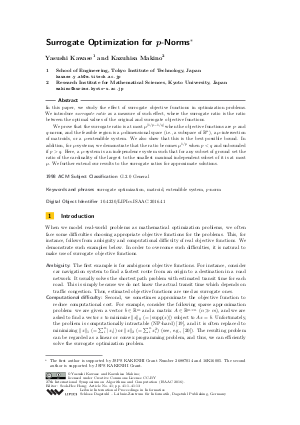Surrogate Optimization for p-Norms
Authors Yasushi Kawase, Kazuhisa Makino
-
Part of:
Volume:
27th International Symposium on Algorithms and Computation (ISAAC 2016)
Part of: Series: Leibniz International Proceedings in Informatics (LIPIcs)
Part of: Conference: International Symposium on Algorithms and Computation (ISAAC) - License:
 Creative Commons Attribution 3.0 Unported license
Creative Commons Attribution 3.0 Unported license
- Publication Date: 2016-12-07
File

PDF
LIPIcs.ISAAC.2016.41.pdf
- Filesize: 0.5 MB
- 13 pages
Document Identifiers
Subject Classification
Keywords
- surrogate optimization
- matroid
- extendible system
- p-norm
Metrics
- Access Statistics
-
Total Accesses (updated on a weekly basis)
0PDF Downloads0Metadata Views
Abstract
In this paper, we study the effect of surrogate objective functions in optimization problems. We introduce surrogate ratio as a measure of such effect, where the surrogate ratio is the ratio between the optimal values of the original and surrogate objective functions.
We prove that the surrogate ratio is at most mu^{|1/p - 1/q|} when the objective functions are p- and q-norms, and the feasible region is a mu-dimensional space (i.e., a subspace of R^mu), a mu-intersection of matroids, or a mu-extendible system. We also show that this is the best possible bound. In addition, for mu-systems, we demonstrate that the ratio becomes mu^{1/p} when p < q and unbounded if p > q. Here, a mu-system is an independence system such that for any subset of ground set the ratio of the cardinality of the largest to the smallest maximal independent subset of it is at most mu. We further extend our results to the surrogate ratios for approximate solutions.
Cite As Get BibTex
Yasushi Kawase and Kazuhisa Makino. Surrogate Optimization for p-Norms. In 27th International Symposium on Algorithms and Computation (ISAAC 2016). Leibniz International Proceedings in Informatics (LIPIcs), Volume 64, pp. 41:1-41:13, Schloss Dagstuhl – Leibniz-Zentrum für Informatik (2016)
https://doi.org/10.4230/LIPIcs.ISAAC.2016.41
BibTex
@InProceedings{kawase_et_al:LIPIcs.ISAAC.2016.41,
author = {Kawase, Yasushi and Makino, Kazuhisa},
title = {{Surrogate Optimization for p-Norms}},
booktitle = {27th International Symposium on Algorithms and Computation (ISAAC 2016)},
pages = {41:1--41:13},
series = {Leibniz International Proceedings in Informatics (LIPIcs)},
ISBN = {978-3-95977-026-2},
ISSN = {1868-8969},
year = {2016},
volume = {64},
editor = {Hong, Seok-Hee},
publisher = {Schloss Dagstuhl -- Leibniz-Zentrum f{\"u}r Informatik},
address = {Dagstuhl, Germany},
URL = {https://drops.dagstuhl.de/entities/document/10.4230/LIPIcs.ISAAC.2016.41},
URN = {urn:nbn:de:0030-drops-68118},
doi = {10.4230/LIPIcs.ISAAC.2016.41},
annote = {Keywords: surrogate optimization, matroid, extendible system, p-norm}
}
